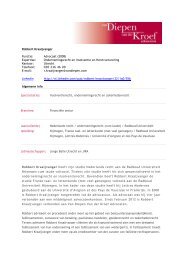© Van Diepen Van der Kroef Advocaten
© Van Diepen Van der Kroef Advocaten
© Van Diepen Van der Kroef Advocaten
- No tags were found...
You also want an ePaper? Increase the reach of your titles
YUMPU automatically turns print PDFs into web optimized ePapers that Google loves.
the European Court of Human Rights was whether the English court was correct in holdingthat immunity was attached to the State of Koewait.165. What is remarkable is that the European Court of Human Rights dismissed the appeal toArticle 6 ECHR and upheld the immunity of the State of Koewait by the smallest possiblemajority of the judges, namely, nine against eight. That indicates already that the absolutecharacter of the immunity of states is debatable un<strong>der</strong> certain circumstances.166. That statement is illustrated by the various dissenting opinions in the judgment. Beforeproceeding deeper into those the Association et al. again presents the ratio decidendi of thedecision (see legal consi<strong>der</strong>ation 66):‘The Court, while noting the growing recognition of the overriding importance of theprohibition of torture, does not accordingly find it established that there is yet acceptancein international law of the proposition that States are not entitled to immunity in respectof civil claims for damages for alleged torture committed outside the forum State.’The use of two words in this ratio is noticeable. First, the word, ‘yet’, whereby theEuropean Court of Human Rights indicates that the passage of time might or even will leadto another view. Secondly, the word, ‘States’ in relation to the fact that immunity remainslimited to the court outside the territory of state in question.Al-Adsani could have sued Koewait in that country, in which event Koewait could not haveinvoked immunity. The Association et al., as already said, fails to perceive any suchalternative in this case.167. The dissenting opinions make it abundantly clear that in certain cases the granting ofimmunity for states is un<strong>der</strong> consi<strong>der</strong>able pressure and should yield to the interests of thecitizen whose rights have been violated. In the dissenting opinion of Judge Loucaides it wassaid:‘In view of the absolute nature of torture it would be a travesty of law to allow exceptionsin respect of civil liability by permitting the concept of State immunity to be relied onsuccessfully against a claim for compensation by any victim of torture. The rationalebehind the principle of international law that those responsible for atrocious acts of<strong>©</strong> <strong>Van</strong> <strong>Diepen</strong> <strong>Van</strong> <strong>der</strong> <strong>Kroef</strong> <strong>Advocaten</strong> page 71 of 99
















